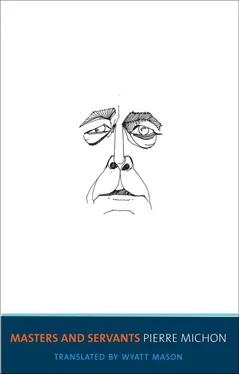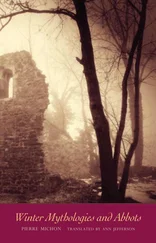Pierre Michon - Masters and Servants
Здесь есть возможность читать онлайн «Pierre Michon - Masters and Servants» весь текст электронной книги совершенно бесплатно (целиком полную версию без сокращений). В некоторых случаях можно слушать аудио, скачать через торрент в формате fb2 и присутствует краткое содержание. Год выпуска: 2013, Издательство: Yale University Press, Жанр: Современная проза, на английском языке. Описание произведения, (предисловие) а так же отзывы посетителей доступны на портале библиотеки ЛибКат.
- Название:Masters and Servants
- Автор:
- Издательство:Yale University Press
- Жанр:
- Год:2013
- ISBN:нет данных
- Рейтинг книги:3 / 5. Голосов: 1
-
Избранное:Добавить в избранное
- Отзывы:
-
Ваша оценка:
- 60
- 1
- 2
- 3
- 4
- 5
Masters and Servants: краткое содержание, описание и аннотация
Предлагаем к чтению аннотацию, описание, краткое содержание или предисловие (зависит от того, что написал сам автор книги «Masters and Servants»). Если вы не нашли необходимую информацию о книге — напишите в комментариях, мы постараемся отыскать её.
Masters and Servants — читать онлайн бесплатно полную книгу (весь текст) целиком
Ниже представлен текст книги, разбитый по страницам. Система сохранения места последней прочитанной страницы, позволяет с удобством читать онлайн бесплатно книгу «Masters and Servants», без необходимости каждый раз заново искать на чём Вы остановились. Поставьте закладку, и сможете в любой момент перейти на страницу, на которой закончили чтение.
Интервал:
Закладка:
Lorentino had faith in the arts, perhaps even more so than Piero, since Lorentino never really succeeded, and yet made it his life; since he never tried to start over again; since he suffered from not knowing how to start over; but he didn’t suffer when, finished in all their glory, the frescoes hadn’t brought down the walls of a little church in Arezzo, didn’t open a great breach for the cavalry of angels. And Lorentino was perhaps happier than Piero, if one can measure such things. The wind whistles through Arezzo, through the night, striking the walls of the chapel of San Francesco within which paintings are in shadow, invisible at this hour, gray and fallen like ashes, ignorant of everything, of the wall that bears them and the hand that had thought they could bring such walls down. The chapel stands tall in the wind. The farmer still far from his home jumps a stream, the Tiber; he misjudges his leap and lands with a foot in the water, splattering into the blackness, he swears and continues on heavily, unhappy about this world that whistles through the trees. Lorentino, whose hand had long ago touched Piero’s hands and remembers them well, thinks about this farmer, about Bartolomeo the Obscure whom Vasari doesn’t mention, about San Francesco in the blackness.
Diosa, his wife, had been beautiful. She had retained her unwrinkled brow and her big eyes; circles beneath those eyes made one think that the soul of a dreamer remained within her old body. She still knew how to smile, and would until she died, probably, as everyone does. Lorentino kept the rest to himself, her toothlessness, her stoop that drags the spirit down with it, the two sacks hanging from her chest, Eve leaning on dying Adam. Diosa was helping Lorentino; together they were cooking this blood in big pots and were adding what spices they had. He quickly realized that only his hands were fussing over the meal; he raised his head: Diosa was standing at the end of the table, leaning against it, the rest of her body weighed infinitely down but upright, her eyes lost but widening at what she was searching for within, and deeply at that, those things one doesn’t quite find and which depart. Her hands hung empty at her sides, she seemed extremely weary and disenchanted, was searching in vain for what reasonably could make sense of this fatigue, this disenchantment, whether through some payment or some end; but no, Lorentino clearly saw that she wasn’t finding it, her spirit beating behind her eyelids, looking everywhere and bumping into everything, the pleasures in life were behind them now, those she had clung to and those she had ceaselessly postponed: Lorentino had lost the touch he once had with her, she no longer had the body that summoned such a touch, and when she was young she hadn’t had the rich dresses seen in dreams, dresses that display a body that one hides when it grows old, and she wouldn’t have such finery, since Lorentino no longer got commissions; each day that came drained her all the more, for even sleep is weary, it no longer restores; she was looking for something she could put in place of her hopes, put in place of all there is to look forward to, tomorrow, when one is twenty — love, dresses, all the exhilaration of being twenty years old. It was beating its wings, this bird, this soul, it was falling from the nest: they had a pig and so it seems that there is a heaven, but that wasn’t really enough for her either.
She noticed that Lorentino had stopped what he was doing, she looked at him. A passionate kind of pity passed between them. Lorentino once again took refuge in this old glance that made him feel both shame and pardon for feeling shame. Her own eyes too had seen Piero, from below, from a little chair in the church where she had waited in vain for his hand to touch the wall and the trumpets of Judgment to burst forth; but below Piero’s sullen expression her twenty-year-old eyes had also seen the painter’s fine doublets; and she was thinking then that her little love who on the opposite wall had been fiddling with hats in uncomplicated shades of blue and highlights on armor would wait passionately for the same thing, would fight the same way, would call forth the trumpets of Judgment the same way, in vain, of course, since this is but the bluster of men who’ve let a few too many of those azure backgrounds go to their heads; she thought that her little love would too have fine doublets; that with this vanity, this pretension, this sulkiness, he too would be celebrated and showered in the gold of the courts, at Urbino, at Rimini, with the Holy Father, that with his failure at setting the trumpets in motion but his success with the princes — a noble failure serving as guarantee of coin in his pockets — he would offer her dresses and servants. She was well out of it now. Again Lorentino heard something resembling bells, now nearer. He thought back to the story of Saint Martin.
PROVIDENCE, he thought, can’t suddenly decide to deceive us.
He grew accustomed to this idea, thought about its every sorrow. He even got a sort of satisfaction from it, an arid comfort, the same felt by children one punishes by not opening the door and who instead of seeking shelter remain beneath the rain with wild eyes, jumping up and down in the puddles, getting covered in mud while crying, but who are drunk with tears. He saw himself as a little child undeserving of such a destiny and relished it. The volleying bells ring loudly and suddenly stop: beyond his illusions — illusions of this Providence that on one hand can do anything and on the other did little for Lorentino — in all the silence, Lorentino saw something very far away. It had to be a memory, but it was surfacing after years of forgetting, a memory so forgotten it was coming out new, real, still, paused before his eyes like a little corner of a painting. It was morning, in the Siennese countryside. The sky was pure. The dew was gone, the hour when the cypresses had drunk it had passed, they had taken it into their great black chiffon, rustling, twisted, had tossed it up into the pearly blue. Around nine o’clock. The cypresses had calmed. The red earth was cooking. On this ground the color of hell that cracks apart but is nonetheless from this world, because it bears shadows and footsteps because it is beneath the sky, there was a beautiful bunch of grapes, crushed on the ground, before which Lorentino was ranting and raving. But he couldn’t hear a word of it, there was only silence, he couldn’t remember. He was twenty-five, he was pointing at the grapes, taking the sky as his witness and gesticulating. That’s what he had first remembered, his gesticulations. He was alone in this violent expanse, in the company of cypresses. Not entirely alone: at nine o’clock forty years before, squatting on an open bundle of disordered belongings, Diosa, head bowed beneath the sun, saying nothing, was on the verge of tears. She was looking at the ground, at the grapes. Lorentino, by his fire in the night in Arezzo, also looked at these grapes, saw the crushed pulp mixed with the Siennese earth. What was going on? And why was Diosa on the brink of tears? He had made only one trip to Sienna, and he had returned with a heavy heart. And this had to be the trip.
He had gone to secure a very coveted commission, on Melozzo’s advice, the little colleague who also had mixed plaster for Piero, and who now was a painter; there were a lot of hopeful painters there; Melozzo got the commission. This was inexplicable to young Lorentino’s heart: immense hope had seized him when the red city of golden painters had risen up at the end of the road, had filled him with all things Siennese — the sky, the purple-shadowed streets, the joy before Sassetta’s lillied arabesques, the women, the saints, the stones of the roads — all this richness that he had within him that his eyes alone released from the world — all this wasn’t enough to make him that uncommon painter who secretly existed, a master whose emotion the commissioners should have divined, and therefore his savoir faire, his burgeoning talent. Was it that Melozzo saw the Siennese light and women with more emotion? Propelled more love toward Sassetta’s flowered saints, had more heart? Without a doubt, since Melozzo had gotten the commission. Lorentino remembered that the magistrates had barely listened to his proposal, had quickly called in the next painter, a Ferrarese who couldn’t have been considered young but who did have that apocalyptic air, young and uncompromising, like hunger; he was a great one; he had looked with such wrath at this pitiful young painter who was on his way out. Lorentino again saw this face perfectly before him, this face held in reserve in his memory for forty years that hadn’t come forward in as long. Fleeing the piazza da Campo , where already the trumpets were heralding the selection of Melozzo da Forli as the magistrates’ choice, Lorentino had cried, leaning against the uncompromising wall of San Domnico from which one sees the whole city, Diosa holding his shoulder and saying something sweet to him from time to time. The bells of San Domênico were ringing at his back, were leaping against him, in this noise Sienna was dancing, climbing straight for the sky as if a great knife had cut the city in two, the length of the ramparts, and had lifted it up toward the mouths of angels. Sienna wasn’t for him. He remembered having thought that it wasn’t worth loving these cities beneath the sun if no one was paying you to paint them, there in the distance, perched firmly on the hillside but rising high into the sky, behind a saint or a donor. And all of a sudden in his tears he had seen the Ferrarese pass before him, the old gothic painter who hadn’t gotten the commission any more than he had but who was walking, with a stiff step, with each step irascibly hitting the ground with his cane, and for a moment he had glimpsed this young man who was crying, and then had left the city all alone by the northern road. Then and there, Lorentino had stopped crying.
Читать дальшеИнтервал:
Закладка:
Похожие книги на «Masters and Servants»
Представляем Вашему вниманию похожие книги на «Masters and Servants» списком для выбора. Мы отобрали схожую по названию и смыслу литературу в надежде предоставить читателям больше вариантов отыскать новые, интересные, ещё непрочитанные произведения.
Обсуждение, отзывы о книге «Masters and Servants» и просто собственные мнения читателей. Оставьте ваши комментарии, напишите, что Вы думаете о произведении, его смысле или главных героях. Укажите что конкретно понравилось, а что нет, и почему Вы так считаете.












